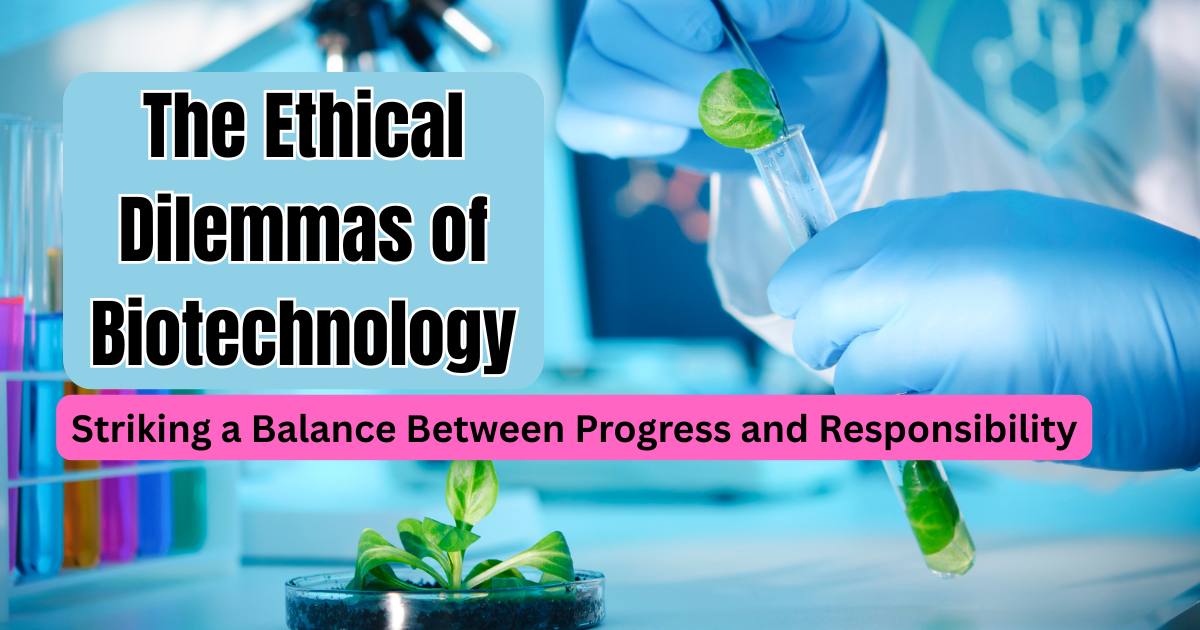The Ethical Dilemmas of Biotechnology: Striking a Balance Between Progress and Responsibility: In today’s rapidly evolving technological landscape, the ethics of technology have become an increasingly pressing and complex issue. As innovation continues to push boundaries and transform various aspects of our lives.
The Ethical Dilemmas of Biotechnology
Biotechnology, a rapidly advancing field at the intersection of science and technology, holds the promise of revolutionizing medicine, agriculture, and various industries. While the potential for groundbreaking innovations is immense, the ethical dilemmas associated with biotechnological advancements cannot be ignored.

There are concerns about the commercialization of life forms and the potential restrictions on use and access to patented technology. Environmental Ethics: Biotechnologies such as biofuels and genetically modified crops have environmental implications that need to be weighed against their benefits.
What is an ethical dilemma?
An ethical dilemma is a type of ethical issue that arises when the available choices and obligations in a specific situation do not allow for an ethical outcome. In such instances a choice or action is required, and all of the available alternatives violate an explicit ethical principle or guideline.
Genetic engineering and designer Babies
The prospect of genetic engineering has opened new frontiers in biotechnology, allowing scientists to manipulate genes and modify traits in organisms, including humans. While the potential benefits include the elimination of genetic diseases, the ethical concerns surrounding the concept of designer babies cannot be overstated.
CRISPR Technology: Editing the Human Genome
This has ushered in a new era of precision in gene editing. This breakthrough tool offers unprecedented potential for treating genetic disorders by precisely modifying the human genome. However, the ability to edit the human genome.
Biohacking and DIY Biology
This is the democratization of biotechnology tools through the rise of biohacking and DIY biology communities that has accelerated innovation. While this accessibility fosters creativity and inclusivity, it also raises concerns about the lack of oversight and potential risks associated with amateur biologists experimenting with genetic materials.
Privacy Concerns in Biomedical Data
As biotechnology advances, especially in the realm of personalized medicine, the generation of vast amounts of biomedical data becomes inevitable. Establishing robust ethical frameworks, transparent data practices, and legal safeguards is essential to ensure privacy rights are respected.
Striking a Balance
In the rapidly advancing field of biotechnology and life science, the intersection of innovation and responsibility has become increasingly complex. One critical area of concern is biosecurity and the potential dual-use nature of scientific research.
1. Defining Dual-Use Research: Dual-use research refers to scientific investigations that have the potential for both beneficial applications and harmful consequences.
2. Biosecurity Measures: To mitigate the risk associated with dual-use research, robust biosecurity measures are essential.
3. International Collaboration and Information Sharing: Scientific progress thrives on collaboration, yet sharing research findings can inadvertently aid malevolent actors.
Striking a Balance Between Progress and Responsibility
In today’s fast-paced world, organizations face the challenge of balancing the drive for innovation with the need for accountability. While pushing the boundaries of technology is compulsory for progress, it must not come at the expense of ethical principles. Striking for progress must not come at the expense of ethical principles. Striking this balance is critical for long-term success, as it ensures that technological advancements benefit society as a whole while maintaining trust and integrity.
Ethics in technology is not a nice-to-have; it is essential for several reasons. Users need to feel confident that new technologies will respect their rights and interests. Secondly, ethical principles safeguard individuals’ privacy. In a world where personal data is constantly being collected, ensuring that this data is handled with care and accuracy is vital. Ethical considerations also include adhering to environmental regulations and designing systems that are sustainable for the long term.
Conclusion
In this article we discussed The Ethical Dilemmas of Biotechnology: Striking a Balance Between Progress and Responsibility. An ethical dilemma is a type of ethical issue that arises when the available choices and obligations in a specific situation do not allow for an ethical outcome. As we navigate the complexities of genetic engineering, CRISPR technology, biohacking, and more, a commitment to ethical principles will guide us toward a future where innovation and responsibility coexist harmoniously in the realm of biotechnology. As innovation continues to push boundaries and transform various aspects of our lives.
